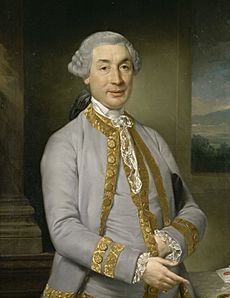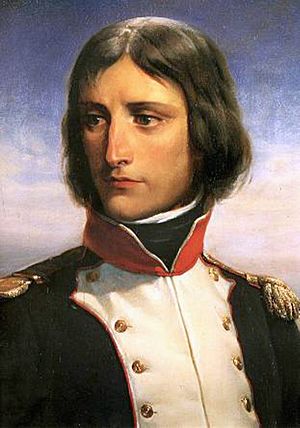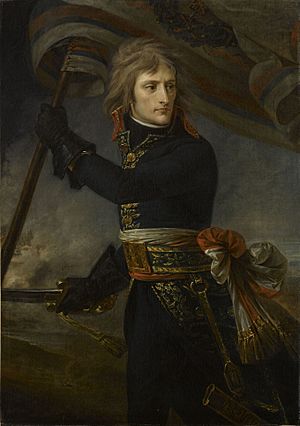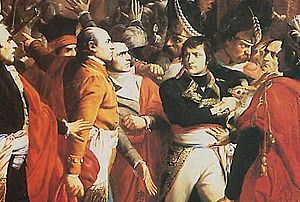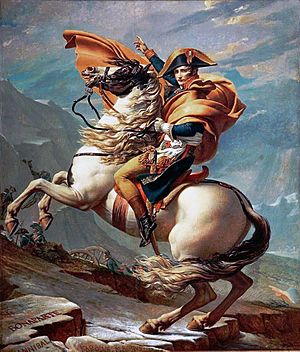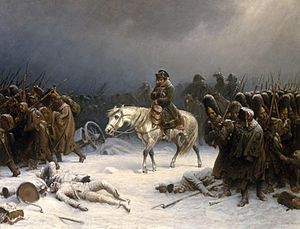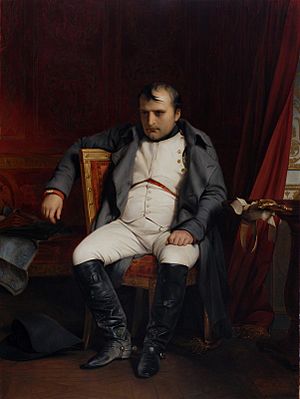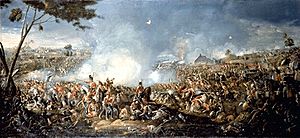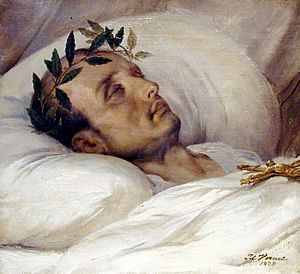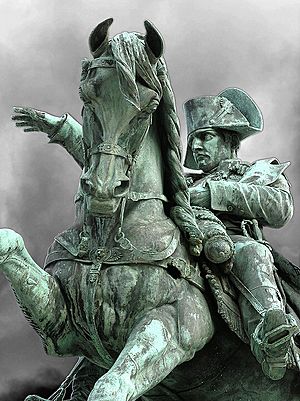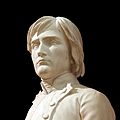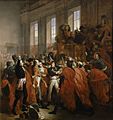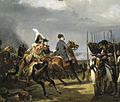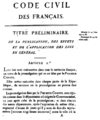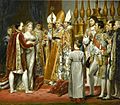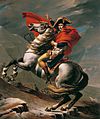Napoleon facts for kids
Quick facts for kids Napoleon I |
|||||
|---|---|---|---|---|---|
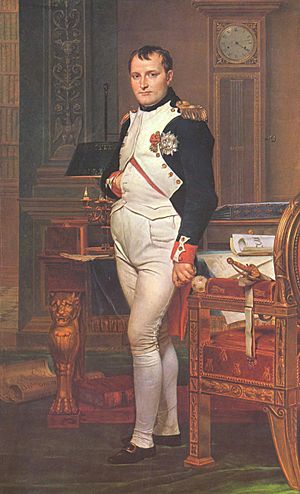
Emperor Napoleon in his study at the Tuileries, by Jacques-Louis David, 1812
|
|||||
| Emperor of the French | |||||
| Reign | 18 May 1804 – 11 April 1814 20 March 1815 – 22 June 1815 |
||||
| Coronation | 2 December 1804 | ||||
| Predecessor | French Consulate Himself as First Consul of the French First Republic. Previous ruling monarch was Louis XVI as King of the French (1791–1792) |
||||
| Successor | Louis XVIII (de jure in 1814; as legitimate monarch in 1815) Napoleon II (according to his father's will of 1815) |
||||
| King of Italy | |||||
| Reign | 17 March 1805 – 11 April 1814 | ||||
| Coronation | 26 May 1805 | ||||
| Predecessor | Himself as President of the Italian Republic Previous ruling monarch was Emperor Charles V, crowned in Bologna in 1530 |
||||
| Successor | Kingdom disbanded Next monarch crowned in Milan was Emperor Ferdinand I, next king of Italy was Victor Emmanuel II of Savoy |
||||
| Born | 15 August 1769 Ajaccio, Corsica |
||||
| Died | 5 May 1821 (aged 51) Longwood, Saint Helena, British Empire |
||||
| Burial | Les Invalides, Paris | ||||
| Spouse | Joséphine de Beauharnais Marie Louise of Austria |
||||
| Issue | Napoleon II of France | ||||
|
|||||
| House | House of Bonaparte | ||||
| Father | Carlo Buonaparte | ||||
| Mother | Letizia Ramolino | ||||
Napoleon Bonaparte (born August 15, 1769 – died May 5, 1821) was a famous French military and political leader. He was known as Napoleon I when he became "Emperor of the French." His actions greatly changed European politics in the early 1800s.
Napoleon was born on the island of Corsica. His family was part of the lower Italian nobility. He trained to be an army officer in mainland France. Napoleon became important during the First French Republic. He led successful battles against groups of countries that were against the French Revolution.
In 1799, he took power in a sudden move called a coup d'état. He made himself the First Consul of France. Five years later, the French Senate made him Emperor. For the first ten years of the 1800s, the French Empire under Napoleon fought the Napoleonic Wars. Many European countries joined these wars. After winning many battles, France became very powerful in Europe. Napoleon made alliances and put his friends and family in charge of other European countries.
Napoleon's first major defeat was during the French invasion of Russia in 1812. His army was badly hurt and never fully recovered. In 1813, other countries defeated his forces at Leipzig. The next year, they attacked France. Napoleon was sent away to the island of Elba. Less than a year later, he escaped Elba and briefly became powerful again. But he was defeated at the Battle of Waterloo in June 1815. Napoleon spent his last six years held by the British on the island of Saint Helena. Doctors said he died of stomach cancer, but some think he was poisoned.
Napoleon's military strategies are still studied today. Some people remember him as a harsh ruler. However, he is also remembered for creating the Napoleonic Code, a set of laws that influenced many countries.
Contents
Early Life and Education
Napoleon Bonaparte was born in Casa Buonaparte in Ajaccio, Corsica, on August 15, 1769. This was just one year after France took control of the island from Genoa. He was the second of eight children. His birth name was Napoleone di Buonaparte. He later used the more French-sounding Napoléon Bonaparte.
The Bonaparte family in Corsica came from a lower noble Italian background. His father, Carlo Buonaparte, became Corsica's representative to the court of Louis XVI in 1777. Napoleon's mother, Maria Letizia Ramolino, had a strong influence on him. She helped control his wild childhood. He had an older brother, Joseph, and younger siblings Lucien, Elisa, Louis, Pauline, Caroline, and Jérôme. Napoleon was baptized as a Catholic on July 21, 1771, at Ajaccio Cathedral.
Becoming a Military Leader
Napoleon entered the military academy at Brienne in 1779 when he was nine years old. He then moved to the Parisian École Royale Militaire in 1784. He graduated a year later as a second lieutenant in the artillery. Napoleon spent much of the next eight years in Corsica. There, he was active in local politics and military matters. He had disagreements with the Corsican nationalist Pasquale Paoli. Because of this, his family had to flee to Marseille in 1793.
The French Revolution caused a lot of fighting and chaos in France. Sometimes, Napoleon was close to those in power. Other times, he was even put in jail. During the French Revolutionary Wars, he helped the Republic fight against royalists who wanted the old king back. In September 1793, he took charge of an artillery group at the siege of Toulon. Royalist leaders there had invited a British fleet and troops. The British were forced out on December 17, 1793. As a reward, Bonaparte was made a brigadier general and sent to the French army in Italy in February 1794.
The 13 Vendémiaire Uprising
General Napoleon Bonaparte was later chosen by the French Republic to stop a royalist uprising on October 5, 1795. More than 1,400 royalists died, and the rest ran away. He cleared the streets using cannons, which a historian later called "a whiff of grapeshot." This victory made him a major general and a known name in the French Revolution.
Defeating the royalist rebels ended the threat to the government. It also brought Bonaparte sudden fame, money, and support from the new Directory (the government at the time). On March 9, 1796, Napoleon married Josephine de Beauharnais. She was a widow older than him, and an unexpected choice for the future ruler.
Campaigns in Italy and Egypt
The campaign in Italy was the first time Napoleon led France into a major war. In March 1796, Bonaparte began a series of attacks to divide and defeat the Austrian and Sardinian armies in Italy. He defeated the Sardinians on April 21, adding Savoy and Nice to France. Then, in a series of brilliant battles, he won Lombardy from the Austrians. Mantua, the last Austrian stronghold in Lombardy, fell in February 1797.
In May 1798, General Napoleon left for a campaign in Egypt. The French wanted to threaten British India. Also, the French Directory was worried Napoleon might try to take control of France. The French Army under Napoleon won a huge victory in the Battle of the Pyramids. Only about 300 French soldiers died, while thousands of Mamluks (a powerful group in the Middle East) were killed. But his army became weak from bubonic plague and lack of supplies. This was because the French Navy was defeated at the Battle of the Nile.
The Egyptian campaign was not a military success for France. However, it was a cultural success. The Rosetta Stone was found by a French engineer, Captain Pierre-François Bouchard. This stone later helped French scholar Jean-François Champollion to read ancient Egyptian hieroglyphs. Napoleon went back to France because of changes in the French government. Some people believe Napoleon should not have left his soldiers in Egypt. Napoleon helped lead the Brumaire coup d'état in November 1799.
Ruler of France
Bonaparte returned to Paris in October 1799. France's situation had improved with some victories. However, the country was out of money, and the government (the Directory) was unpopular. One of the Directors, Emmanuel Joseph Sieyès, asked Napoleon for help to overthrow the government. Other leaders involved in the plan included Napoleon's brother Lucien Bonaparte, Roger Ducos, Joseph Fouché, and Charles Maurice Talleyrand.
Some lawmakers realized it was an attempted takeover. Faced with their protests, Bonaparte brought in troops to take control and scatter them. This left a small group of lawmakers who named Bonaparte, Sieyès, and Ducos as the three temporary Consuls to run the government.
Sieyès expected to be the most powerful in the new government. But Napoleon outsmarted him. Napoleon wrote the new Constitution, which made him the First Consul. This made Bonaparte the most powerful person in France. He moved into the Tuileries Palace.
In 1800, Napoleon secured his power by crossing the Alps. He defeated the Austrians at Marengo. He then arranged a peace agreement for Europe. This agreement set the Rhine River as France's eastern border. He also made a deal with the Pope (the Concordat of 1801). This helped bring peace to France by ending the disagreements with the Roman Catholic Church that had started during the French Revolution.
In France, the government was reorganized. The court system was made simpler. All schools were put under central government control. French law was made standard in the Napoleonic Code, also called the civil code, and six other codes. These laws protected rights like equality before the law and freedom of religion, which were won in the Revolution.
Emperor of France
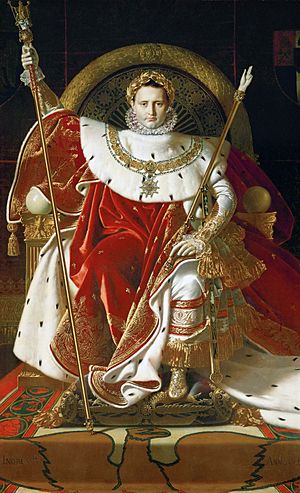
In February 1804, a plot against Bonaparte, funded by the British, was discovered. This gave Napoleon a reason to start a family line of rulers. On December 2, 1804, Napoleon Bonaparte crowned himself "Emperor of the French." The French people did not see him as a king from the old days. He invited Pope Pius VII to his coronation at Notre Dame Cathedral in Paris. During the ceremony, Napoleon took the crown from the Pope and placed it on his own head. This had been planned between them. At Milan Cathedral on May 26, 1805, Napoleon was crowned King of Italy.
Important Reforms
To bring back prosperity (wealth and success), Napoleon updated France's finance system. He controlled the economy to manage prices. He also encouraged new industries and built roads and canals. To make sure there were good officials and military officers, he created a system of public schools. These schools were under strict government control. He also canceled some social changes made during the French Revolution. He made peace with the Catholic Church in the Concordat of 1801. This agreement kept the Church under state control but allowed religious freedom for Catholics.
Napoleon I gained support from different groups of people. He encouraged French people who had left the country (called émigrés) to return, if they promised loyalty. Peasants were happy when he said they could keep the lands they had bought during the French Revolution. Napoleon's main opponents were royalists (who wanted a king) and republicans (who wanted a republic).
The Napoleonic Code
One of Napoleon's most lasting changes was a new set of laws, known as the Napoleonic Code. It included ideas from the Age of Enlightenment, such as all citizens being equal before the law. It also allowed religious freedom and promoted people based on their skills. However, the Napoleonic Code also undid some changes from the French Revolution. For example, women lost most of their new rights. The law treated women like minors, meaning they could not have full citizenship rights. Male heads of families got back full control over their wives and children. Napoleon valued order and authority more than individual rights.
Building a Grand Empire
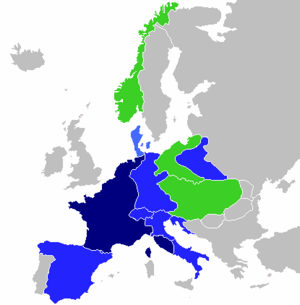
Emperor Napoleon gave up his plans to invade England. Instead, he turned his armies against the Austrian and Russian forces. He defeated them at the Battle of Austerlitz on December 2, 1805. In 1806, Napoleon destroyed the Prussian army at Jena and Auerstädt. He also defeated the Russian army at Friedland. He made his older brother Joseph Bonaparte King of Naples and Sicily in 1806. He also turned the Dutch Republic into the Kingdom of Holland for his brother Louis. Napoleon also created the Confederation of the Rhine, which included most German states, and he was its protector.
To make his rule stronger, he divorced his wife Joséphine. He then married Marie Louise, who was a duchess and the daughter of Emperor Francis I of Austria. Soon, she gave birth to a son. This son was the heir to the Bonaparte family. He was named Napoléon François Joseph Charles Bonaparte, or Napoleon II. He was crowned King of Rome from his birth.
At Tilsit in July 1807, Napoleon made an ally of the Russian tsar Alexander Romanov. He also greatly reduced the size of Prussia. He added new states to his empire. These included the Kingdom of Westphalia, ruled by his youngest brother Jerome, and the Duchy of Warsaw.
Major Defeats
The Congress of Erfurt aimed to keep the alliance between Russia and France. The leaders had a friendly relationship after their first meeting in 1807. However, on June 23, 1812, Napoleon went to war with Russia. The French invasion of Russia led to the defeat of many Russian cities and villages. But by the time they reached Moscow, it was winter. The Russian army used "scorched earth" tactics, burning everything. This meant the French found little food for themselves and their horses. Napoleon's army could not defeat the Russians. The Russians began to attack. Napoleon and his army had to go back to France. The French suffered greatly during Napoleon's retreat. Most of his soldiers never returned to France. His army was reduced to 70,000 soldiers and 40,000 stragglers. This was against more than three times as many Allied troops. Finally, at the Battle of the Nations in 1813, he was defeated by the Allies: Sweden, Russia, Austria, and Prussia.
Exile and Final Days
Napoleon had no choice but to give up his throne in favor of his son. However, the Allies refused to accept this. Napoleon gave up his power without conditions on April 11, 1814. Before his official abdication, Napoleon tried to take his own life, but it did not work. In the Treaty of Fontainebleau, the winners sent him to Elba. This was an island of 12,000 people in the Mediterranean Sea. The Allies allowed Napoleon to keep the title "Emperor of Elba." He also received an allowance of 2 million francs a year. Napoleon even asked for a 21-gun salute as emperor of the island of Elba. Many leaders feared that Elba was too close to Europe to keep such a dangerous person.
The Hundred Days
Napoleon was separated from his son and wife, who were under Austrian control. He was also cut off from the money promised by the Treaty of Fontainebleau. He heard rumors that he would be sent to a very remote island in the Atlantic Ocean. So, Napoleon escaped from Elba on February 26, 1815. He made a surprise march to Paris on March 1, 1815. His old troops joined him, and Louis XVIII fled into exile. Napoleon became ruler of France again for 100 days.
Napoleon was defeated at the Battle of Waterloo by the British under Duke of Wellington and the Prussians on June 18, 1815. This was his last battle. Napoleon was captured again and sent to his second exile on the island of Saint Helena in the Atlantic Ocean.
Second Exile and Death
Napoleon was sent to the island of Saint Helena, off the coast of Africa. He died on May 5, 1821, from stomach cancer. Napoleon kept up with news from Europe and hoped to be released if a new Prime Minister came to power in Britain. There were other plans to rescue Napoleon from captivity. One plan came from Texas, where exiled soldiers wanted to bring back Napoleon's empire in America. There was even a plan to rescue him with a simple submarine. For the poet Lord Byron, Napoleon was a perfect example of a Romantic hero: a misunderstood, lonely, and flawed genius. The news that Napoleon had started gardening at Longwood also appealed to British people.
What is Napoleon's Legacy?
French people are still proud of Napoleon's glorious days. The Napoleonic Code is still a basis for the modern French Constitution. Weapons and military technology did not change much during Napoleon's time. However, how armies moved and fought changed a lot. Napoleon's biggest impact was on how wars were fought. His popularity later helped his nephew Louis-Napoléon become ruler of France.
On the world stage, Napoleon's conquests spread the ideas of the French Revolution. He failed to make Europe into a French Empire. Instead, he sparked feelings of nationalism (strong loyalty to one's own country) across Europe.
Interesting facts about Napoleon
- In 1803, Napoleon made a deal with the United States called the Louisiana Purchase. He sold a massive amount of land (which is now a big part of the central USA) to the Americans for $15 million. This helped the USA grow much larger!
- He officially brought the metric system to France in 1801, which uses units like meters and kilograms. This system is now used in most countries around the world.
- Napoleon also reformed the education system, creating schools called "lycées" to train future leaders and professionals. He believed in a strong public education system.
- He created the Legion of Honour, a special award for people who did great things for France, whether in the military or in civilian life. It's still France's highest honor today!
- In 1840, his remains were brought back to France and buried with great honor in a magnificent tomb at Les Invalides in Paris, where they rest today.
- Napoleon is mentioned in the second verse of the Polish national anthem, a testament to the period when Polish patriots pinned their hopes on his military success to restore their nation.
- "Little Boney" was a popular derisive nickname for Napoleon Bonaparte used in British propaganda during the Napoleonic Wars. The nickname played on the perception, heavily promoted by British caricaturists, of Napoleon as a small, childish, and petulant man. This was meant to diminish his image as a fearsome military genius.
- While a common myth holds he was extremely short, he was actually about 5 feet 6 inches (1.68 meters), which was average for a Frenchman of his time.
Napoleon Quotes
- “The surest way to remain poor is to be honest“
- “Ability is of little account without opportunity.”
- “I can no longer obey; I have tasted command, and I cannot give it up.”
- “Women are nothing but machines for producing children.”
- “If you wish to be a success in the world, promise everything, deliver nothing.”
- “In politics... never retreat, never retract... never admit a mistake.”
- “He who fears being conquered is sure of defeat.”
- “Soldiers generally win battles; generals get credit for them.”
- “The best cure for the body is a quiet mind.”
- “What is history but a fable agreed upon?”
- "Kiss the feet of Popes provided their hands are tied."
- "Never interrupt your enemy when he is making a mistake"
Images for kids
-
Bonaparte at the Siege of Toulon
-
Bonaparte at the Pont d'Arcole, by Baron Antoine-Jean Gros, (c. 1801), Musée du Louvre, Paris
-
Bonaparte Before the Sphinx (c. 1886) by Jean-Léon Gérôme, Hearst Castle
-
Battle of the Pyramids on 21 July 1798 by Louis-François, Baron Lejeune, 1808
-
Bonaparte, First Consul, by Ingres. Posing the hand inside the waistcoat was often used in portraits of rulers to indicate calm and stable leadership.
-
The Battle of Marengo was Napoleon's first great victory as head of state.
-
The 1803 Louisiana Purchase totalled 2,144,480 square kilometres (827,987 square miles), doubling the size of the United States.
-
The Coronation of Napoleon by Jacques-Louis David (1804)
-
Napoleon and the Grande Armée receive the surrender of Austrian General Mack after the Battle of Ulm in October 1805. The decisive finale of the Ulm Campaign raised the tally of captured Austrian soldiers to 60,000. With the Austrian army destroyed, Vienna would fall to the French in November.
-
Napoléon in his coronation robes by François Gérard, c. 1805
-
Napoleon at the Battle of Austerlitz, by François Gérard 1805. The Battle of Austerlitz, also known as the Battle of the Three Emperors, was one of Napoleon's many victories, where the French Empire defeated the Third Coalition.
-
The Iranian envoy Mirza Mohammed Reza-Qazvini meeting with Napoleon I at the Finckenstein Palace in West Prussia, 27 April 1807, to sign the Treaty of Finckenstein
-
Napoleon reviewing the Imperial Guard before the Battle of Jena
-
The Treaties of Tilsit: Napoleon meeting with Alexander I of Russia on a raft in the middle of the Neman River
-
Joseph Bonaparte, Napoleon's brother, as King of Spain
-
Napoleon accepting the surrender of Madrid, 4 December 1808
-
Napoleon at the Battle of Wagram, painted by Horace Vernet
-
The entry of Napoleon in Schönbrunn, Vienna
-
Frederick Marryat's sketch of Napoleon's body on his deathbed
-
Napoleon's tomb at Les Invalides in Paris
-
Napoleon's remains passing through Jamestown, St Helena on 13 October 1840
-
Napoleon is often represented in his green colonel uniform of the Chasseur à Cheval of the Imperial Guard, the regiment that often served as his personal escort, with a large bicorne and a hand-in-waistcoat gesture.
-
First remittance of the Légion d'Honneur, 15 July 1804, at Saint-Louis des Invalides, by Jean-Baptiste Debret (1812)
-
The Third of May 1808 by Francisco Goya, showing Spanish resisters being executed by French troops
-
Bas-relief of Napoleon in the chamber of the United States House of Representatives
-
Joséphine, first wife of Napoleon, obtained the civil dissolution of her marriage under the Napoleonic Code, painting by Henri Frédéric Schopin, 1843
-
Marriage of Napoleon and Marie-Louise by Georges Rouget, 1843
-
Napoleon Crossing the Alps, romantic version by Jacques-Louis David in 1805
-
Bonaparte Crossing the Alps, realist version by Paul Delaroche in 1848
See also
 In Spanish: Napoleón Bonaparte para niños
In Spanish: Napoleón Bonaparte para niños
 | Selma Burke |
 | Pauline Powell Burns |
 | Frederick J. Brown |
 | Robert Blackburn |


